WP Rocket is suggested as the best cache plugin. I learnt on Google that it had many good features. In many of the reviews I read, it was giving the best score. I already was using SiteGround (SG) as web hosting.
The magic of SG is its default performance boosting plugin called SG Optimizer. I was very satisfied with its results.
It supports GZIP compression, Browser caching, Minification of HTML, CSS, JS files, Combine CSS files, Image Optimization, Lazy Load Images etc.
WP Rocket vs SG Optimizer: A Comprehensive Comparison
Plugins like WP Rocket and SG Optimizer offer robust solutions, each tailored to different needs and hosting environments.
While WP Rocket is renowned for its premium features and standalone functionality, SG Optimizer is a powerful option for those hosted on SiteGround’s infrastructure.
Site speed is crucial for delivering a good user experience and boosting your search rankings. Two popular plugins that aim to optimize WordPress performance are SiteGround Optimizer and WP Rocket. But which plugin is better suited for your needs?
In this comprehensive article, we’ll delve deeply into these two plugins, analyze their features in detail, share real-world test results, and discuss scenarios to help you make an informed decision on which one best suits your website’s requirements.
Whether you’re looking to enhance page speed, optimize media, or implement advanced caching strategies, this guide will provide the clarity you need.
This comparison examines the features, capabilities, and performance of SiteGround Optimizer and WP Rocket to help you determine the best option.
What Is WP Rocket?
WP Rocket is one of the most popular premium caching plugins for WordPress. Known for its ease of use, WP Rocket requires minimal configuration to deliver powerful results.
Features of WP Rocket
- Page Caching: Automatically creates static HTML files for faster loading.
- Cache Preloading: Preloads cache to ensure faster load times for visitors.
- File Optimization: Minifies CSS, JavaScript, and HTML files to reduce size.
- Lazy Loading: Optimizes media by loading images only when visible to users.
- Database Optimization: Cleans up WordPress databases to reduce bloat.
- CDN Compatibility: Easily integrates with Content Delivery Networks.
What Is SG Optimizer?
SG Optimizer is a free plugin provided by SiteGround, designed to work exclusively with their hosting platform. It leverages SiteGround’s server-level features to optimize site performance.
NGNIX Direct Delivery
SG Optimizer uses NGNIX Direct Delivery to bypass PHP for serving static files, significantly reducing server load and improving site speed.
Dynamic Cache
Dynamic Cache stores dynamic content for logged-in users, improving the experience for users accessing personalized data.
Memcached
SG Optimizer integrates Memcached to speed up database queries, reducing latency for dynamic content delivery.
Features of SG Optimizer
- SuperCacher Integration: Enhances caching capabilities through SiteGround’s proprietary SuperCacher.
- Frontend Optimization: Minifies CSS and JavaScript files and eliminates render-blocking resources.
- Media Optimization: Supports lazy loading and WebP format for images.
- Environment Optimization: Enforces HTTPS, optimizes PHP versions, and integrates GZIP compression.
WP Rocket vs SG Optimizer Performance Test
WordPress plugins used on the Site
Active Plugins: Accelerated Mobile Pages, Ad Inserter, Akismet Anti-Spam, Classic Editor, Lightweight Subscribe To Comments, Contextual Related Posts, Cookie Notice, Easy Table of Contents, EWWW Image Optimizer, Inline Related Posts, kk Star Ratings, Link Juice Keeper, Redirection, Schema Creator by Raven, SG Optimizer, TablePress, Ultimate Category Excluder, Wordfence Security, Yoast SEO, WP Review Pro, WP Rocket, WP Shortcode Pro by MyThemeShop
I have selected 3 pages to test the efficiency of WP-Rocket + SG Optimizer combination on page load speed.
The pages were of different size having more than 10+ images, from the same website.
WP Rocket vs SiteGround Optimizer – Active State
#1 Using PageSpeed Insights (Google tool)
Typical test showed the following results of one of the pages.
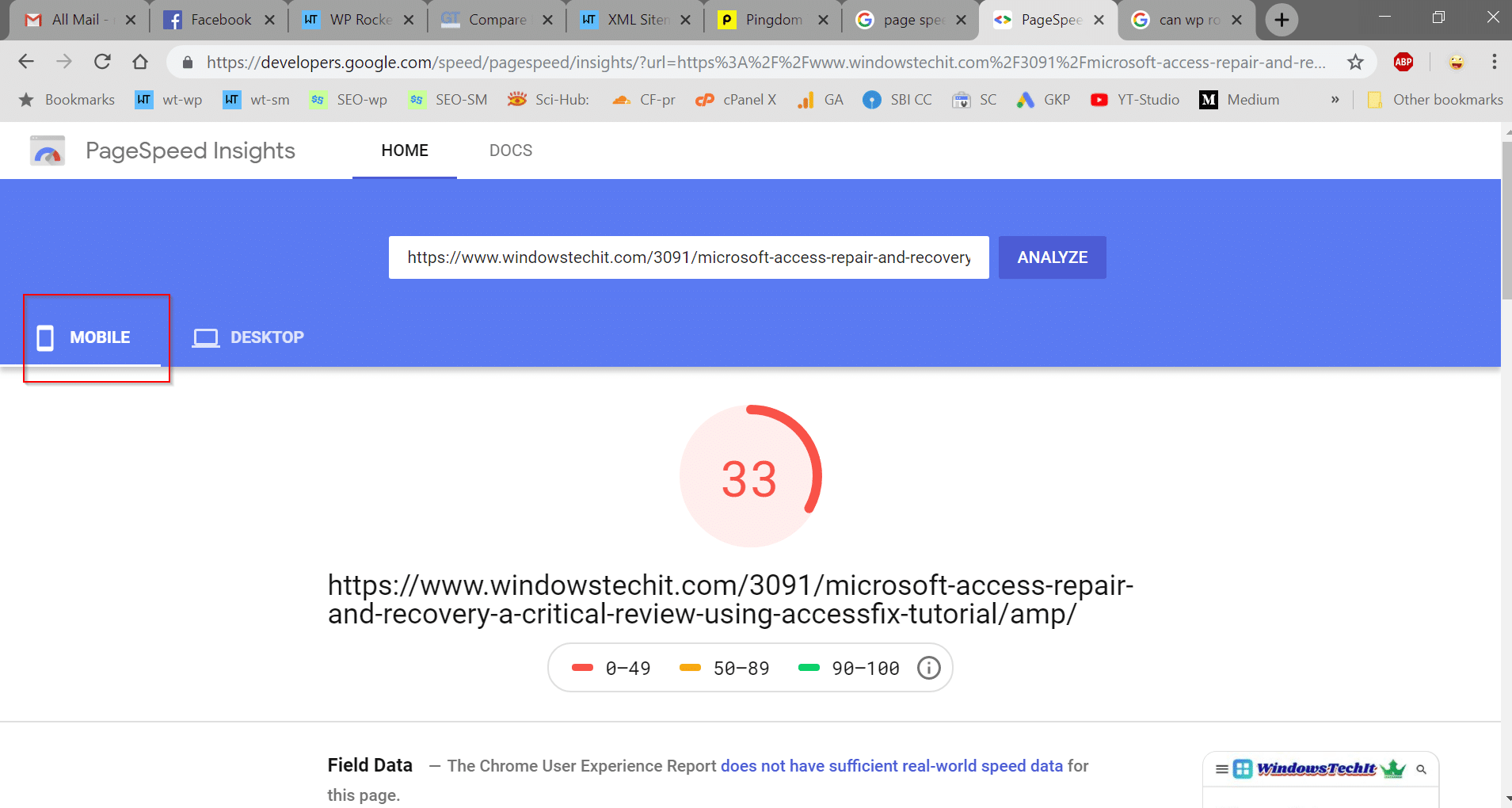
In all the 3 tests, the mobile version had a very low score between 30 to 40.
The desktop version faired better between 70 to 85.
In May 2019, Google made it clear that mobile-indexing will be the first priority for all devices. In this context it is important, you have a low mobile page loading time.
As mentioned before, there were several red marks in the PageSpeed lab data.
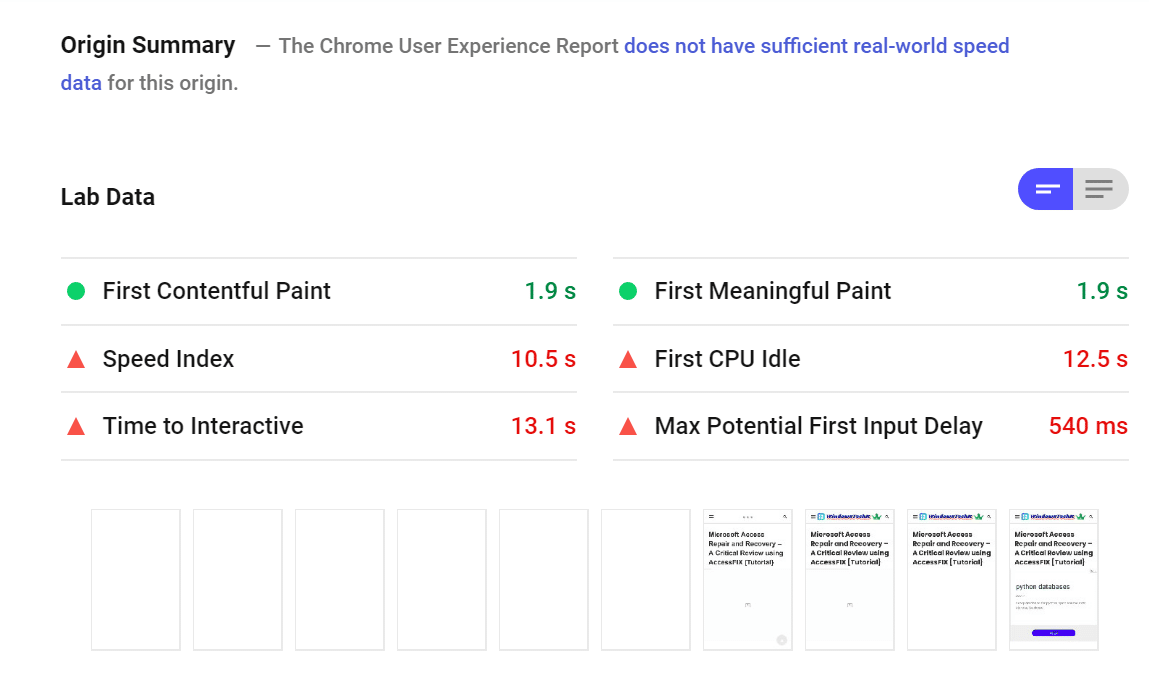
Speed Index, First CPU Idle, Time to Interactive, Max Potential First Input Display were showing negative results, in-spite of using WP-Rocket
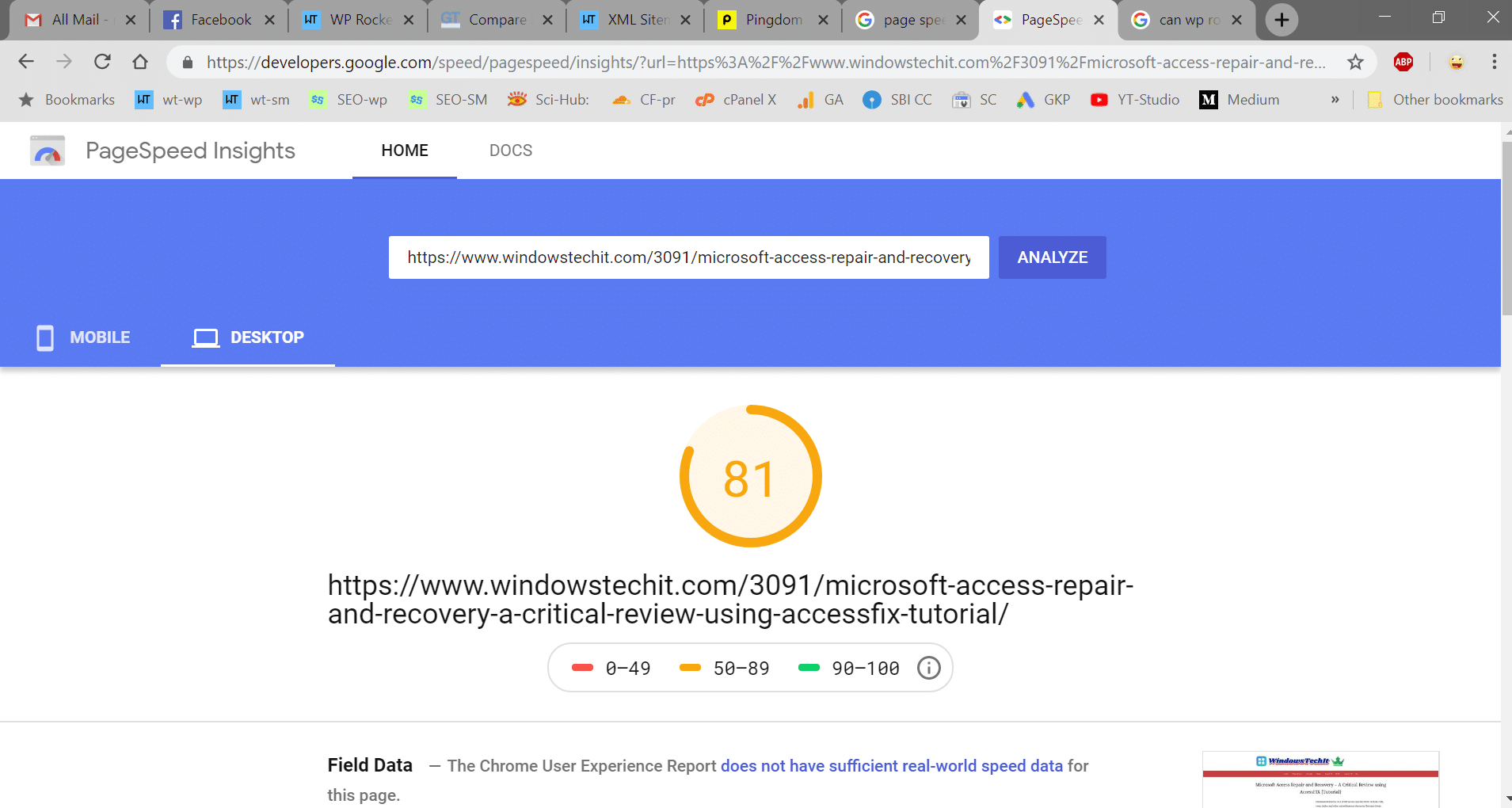
The above is the desktop score which is far better than mobile pagespeed value. Also, the speed factors are good compared to mobile. I don’t know the reason behind this, but desktop looks OK. You can see that except speed index, other factors are green.
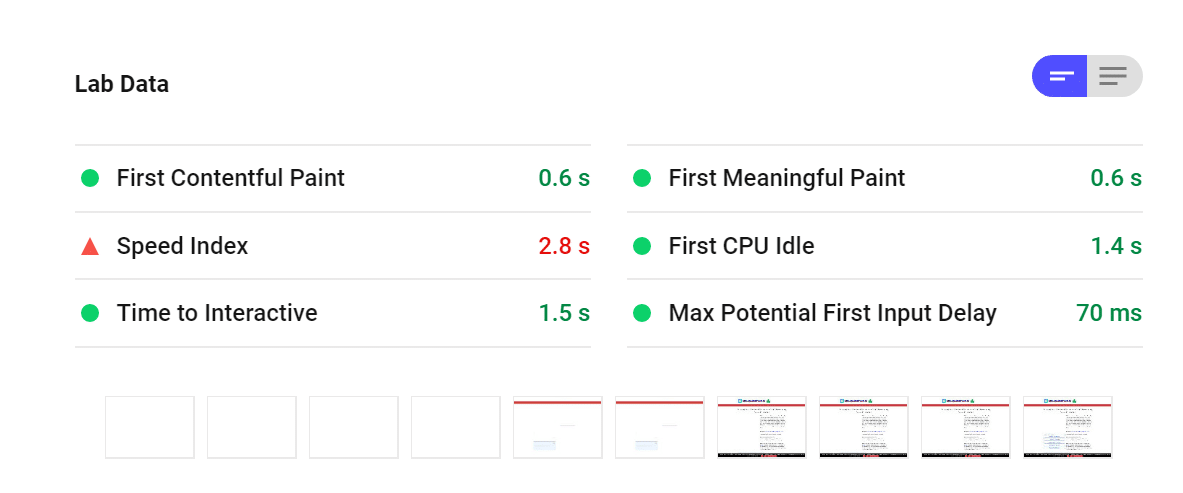
#2 Using GTMetrix Page Speed Testing Tool
The PageSpeed Grade was high for all the 3 pages. It was above 90 with an A grade.
The YSlow Grade was showing C grade with a score of around 75.
It shows that all the pages were of size around 600KB.
The fully loaded time took between 2.8s to 3.5s.
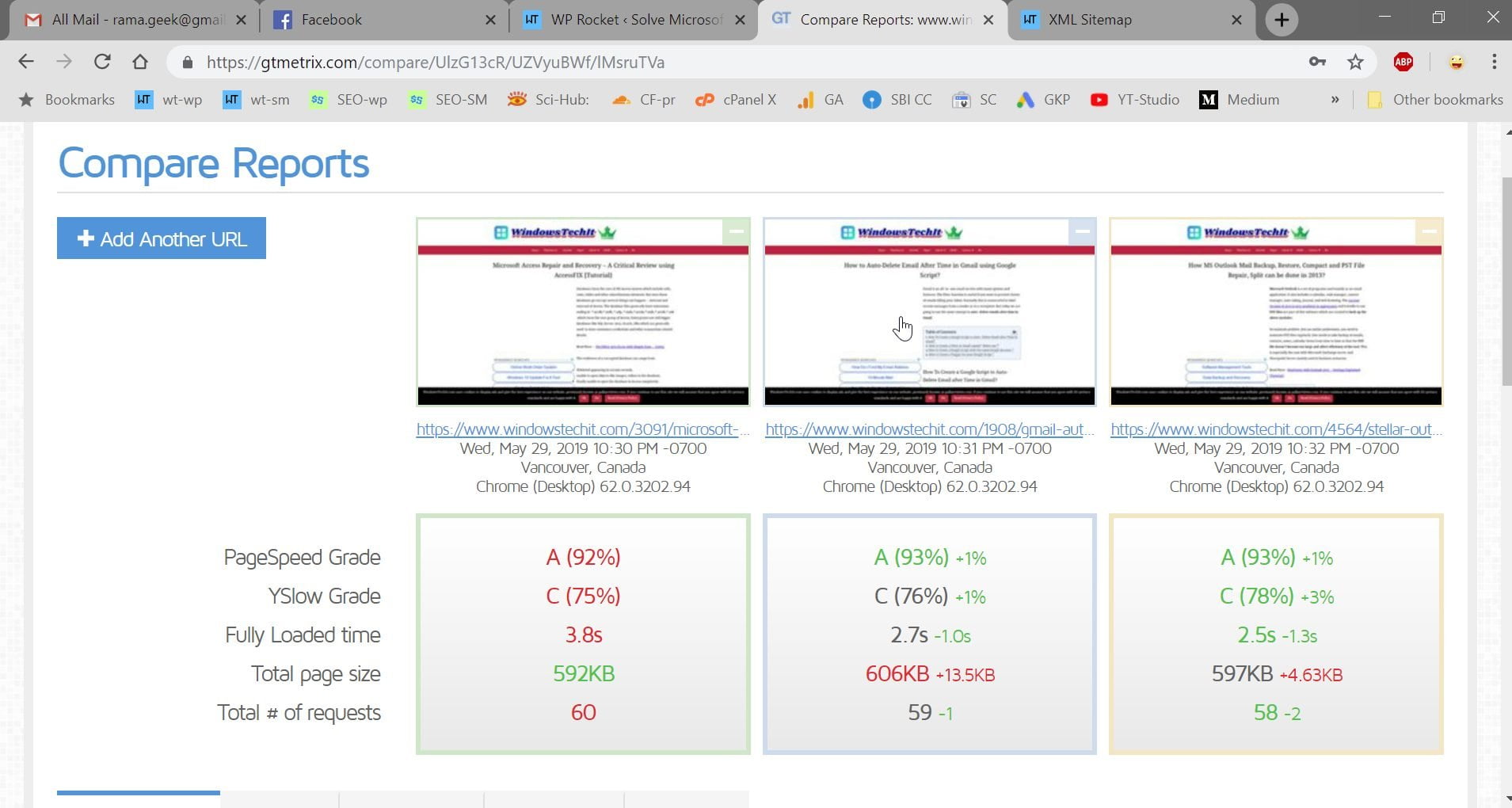
The following were some of the parameters with a low grade or score in the PageSpeed test.
1. Leverage browser caching
2. Minimize request size
The YSlow score showed the following deficiences.
1. Add Expire headers
2. Reduce DNS lookups.
3. Use cookie-free domains.
#3 Using Pingdom Page Speed Testing Tool
I also tested the same web pages using Pingdom tools. I used the test server from Germany.
My hosting server was located in United States. So I wanted to check if there will be any huge difference in page loading times, when the server is far.
The performance grade score was C or D. It was giving a score of around 70.
The pagesize was the same as GTMetrix approximately.
But the load time deferred here, taking only around 1 sec.
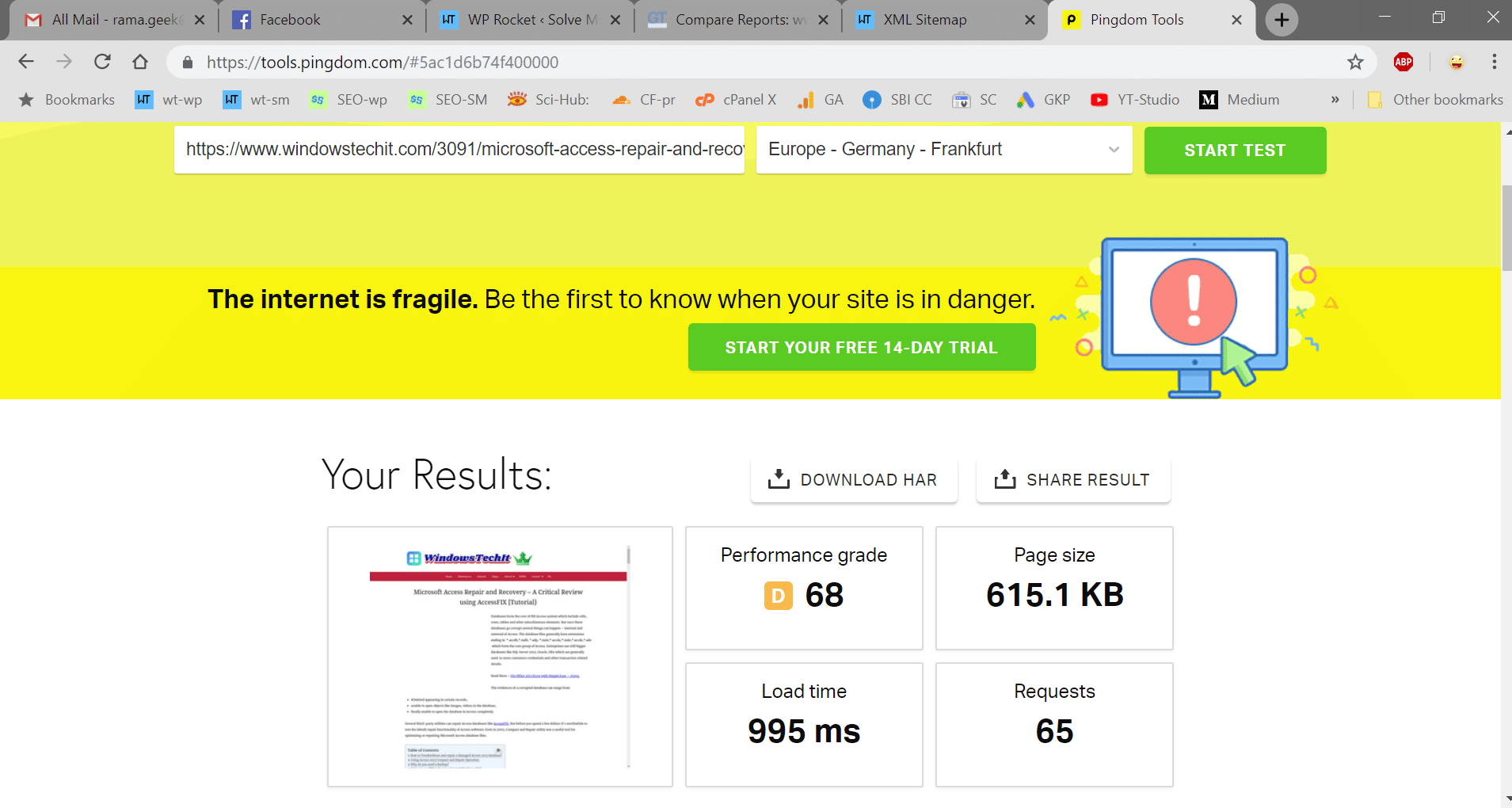
The following parameters were required to improve page performance.
1. Make fewer HTTP requests.
2. Compress components with gzip.
3. Use cookie-free domains.
4. Reduce DNS lookups
5. Add Expires headers.
WP Rocket vs SiteGround Optimizer – Inactive state
I have tested the same results after disabling the WP-Review plugin. All the other plugins remained same. I also cleared the Cloudflare cache, SG Optimizer cache and browser (Google Chrome) cache.
The mobile score was between 45 to 50. The desktop score was 85 to 90.
]Note: One thing I observed is that the score changes, if you do the test repetitively. Also, there is some lag time before running the same test again. It is better you clear the browser cache after each iteration.
Since WP-Rocket itself emphasizes not to rely much on score than on page loading time, it is not required to seriously consider the score value.
I’m giving the speed details of mobile pages (basically AMP pages on my front) for all the 3 pages tested.
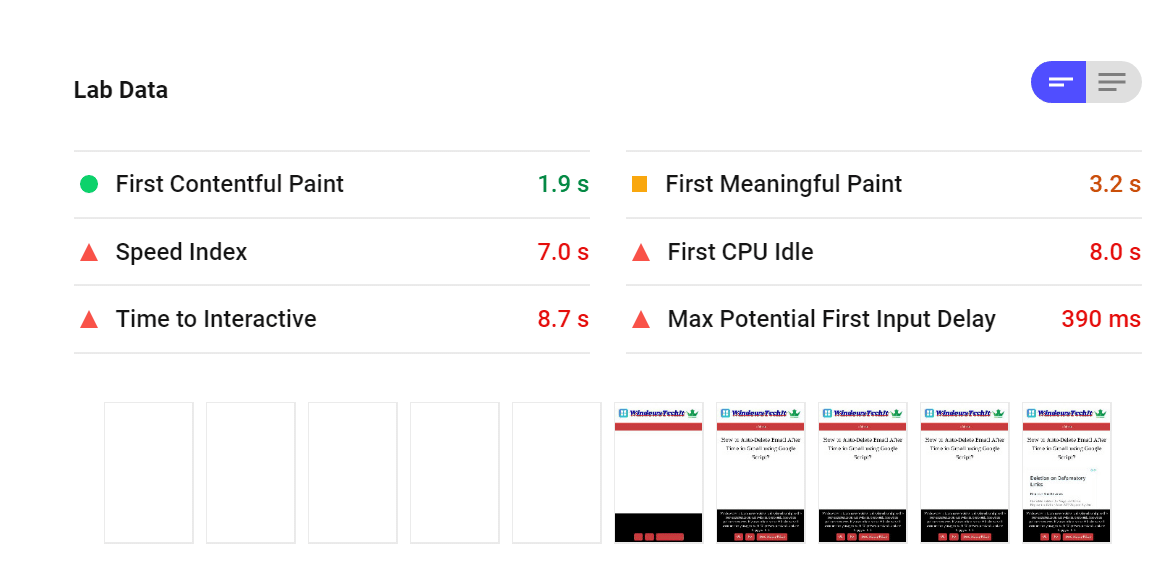
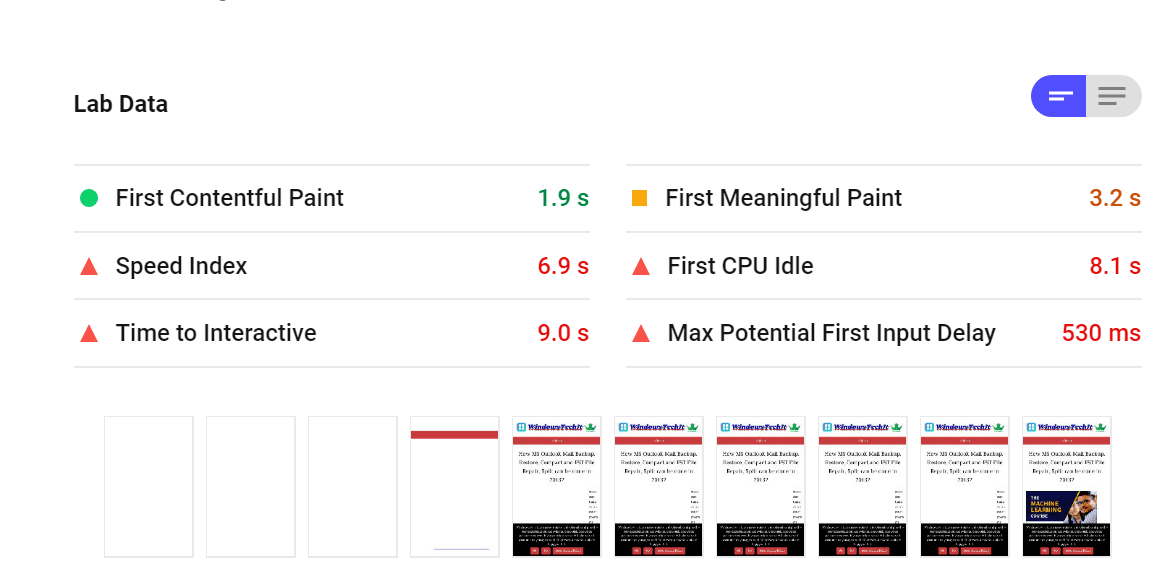
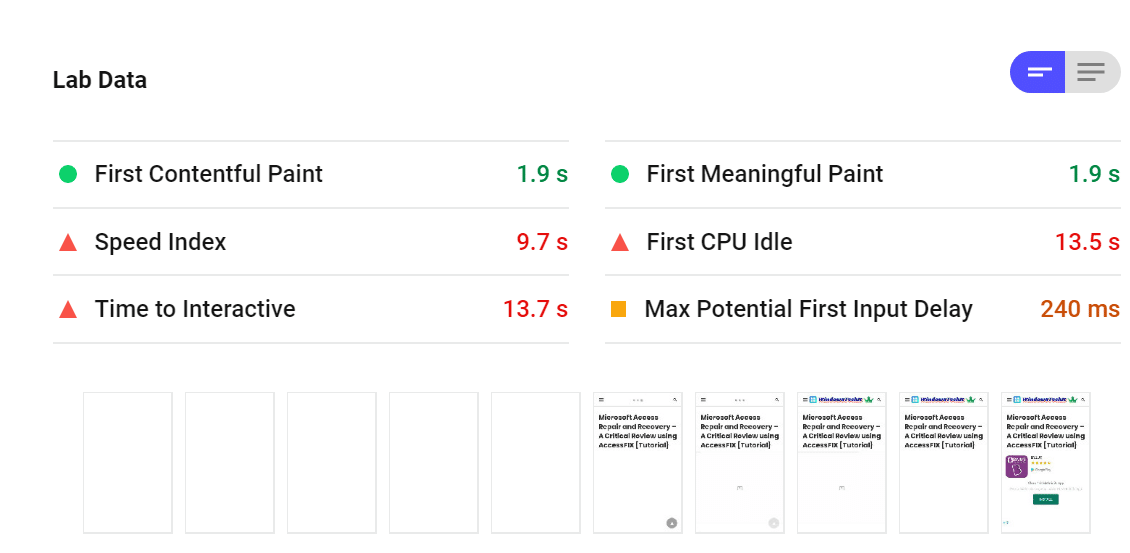
GTMetrix Test Results without WP Rocket
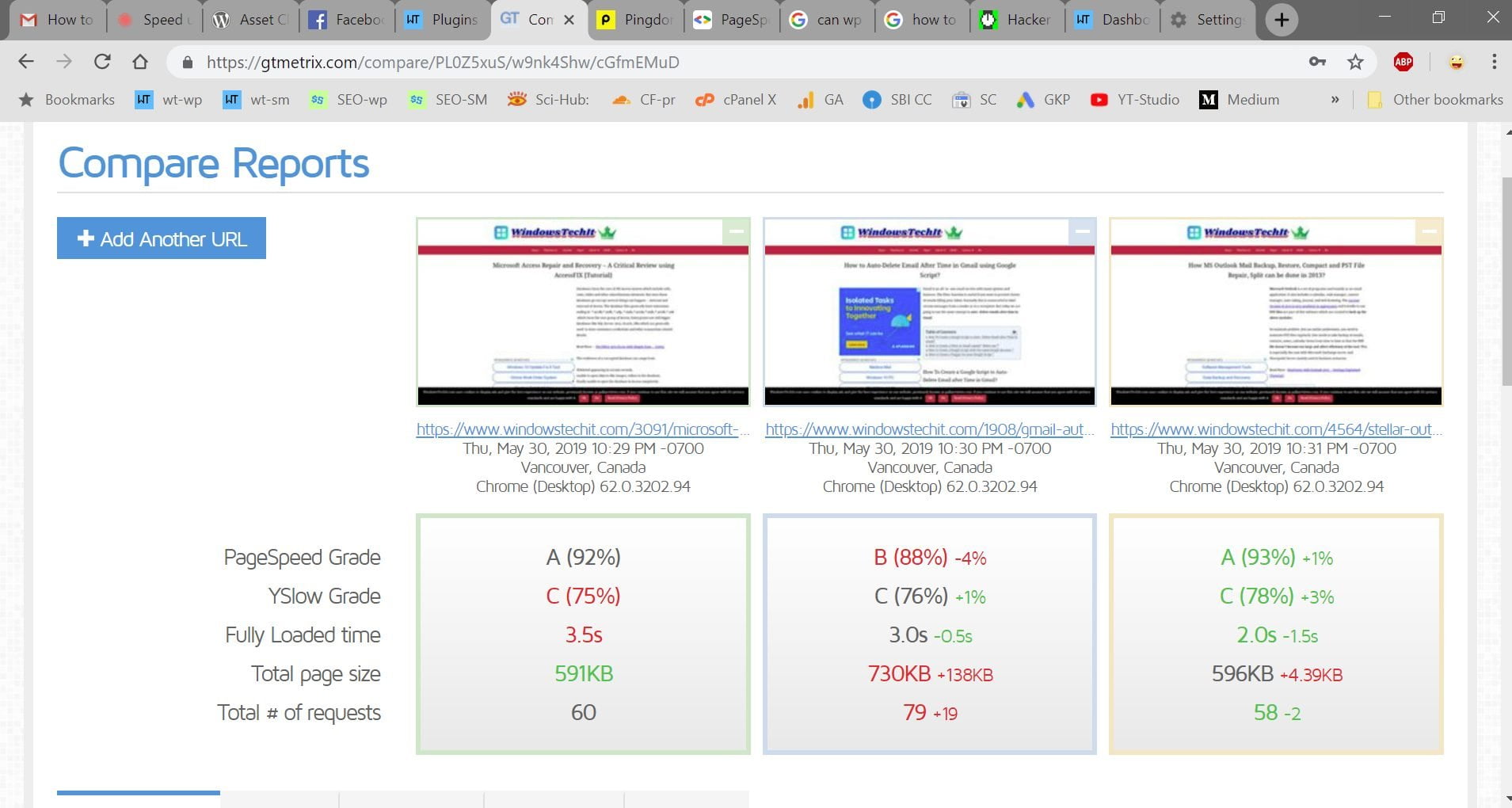
Pingdom Test Results without WP Rocket
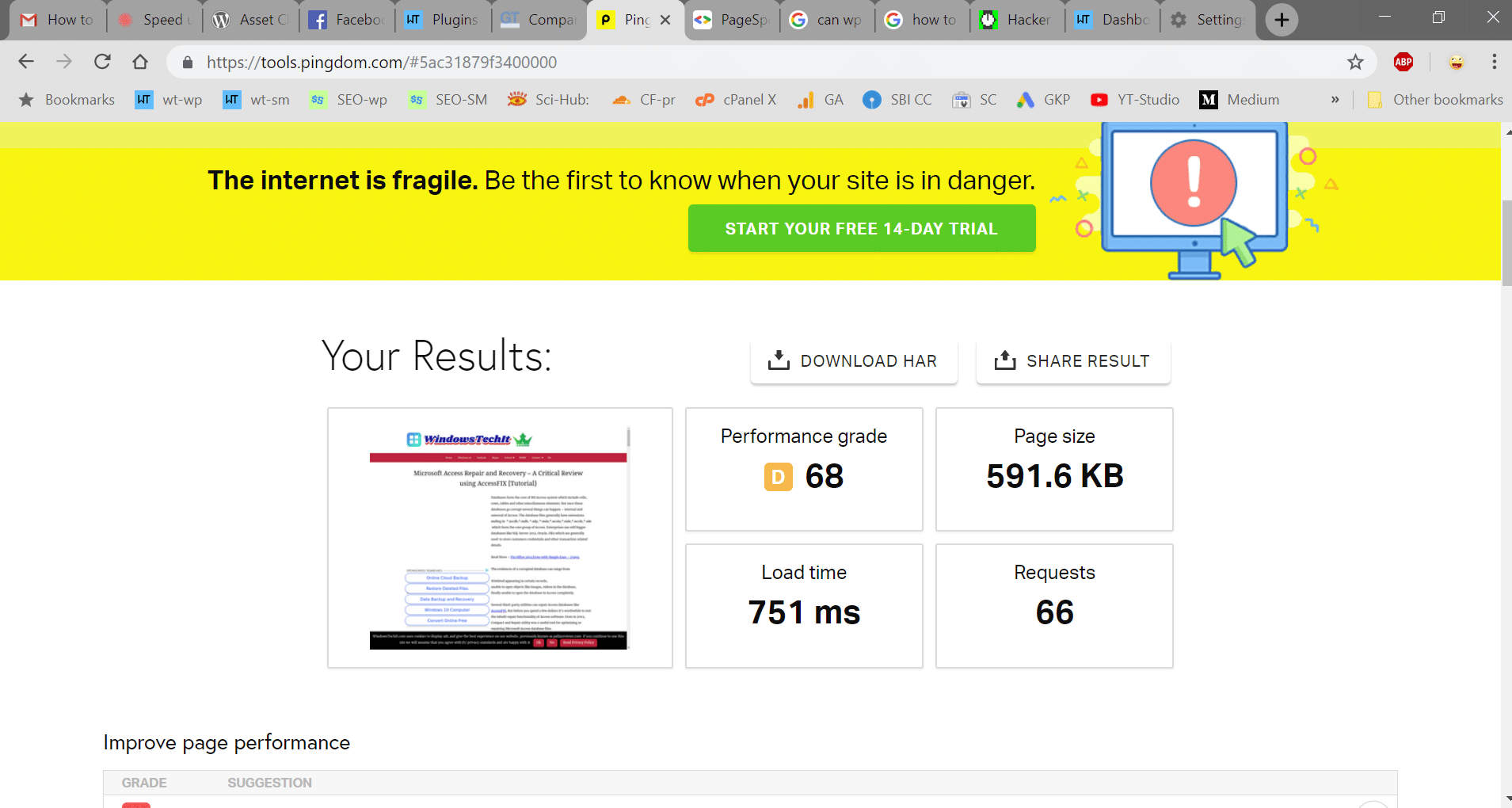
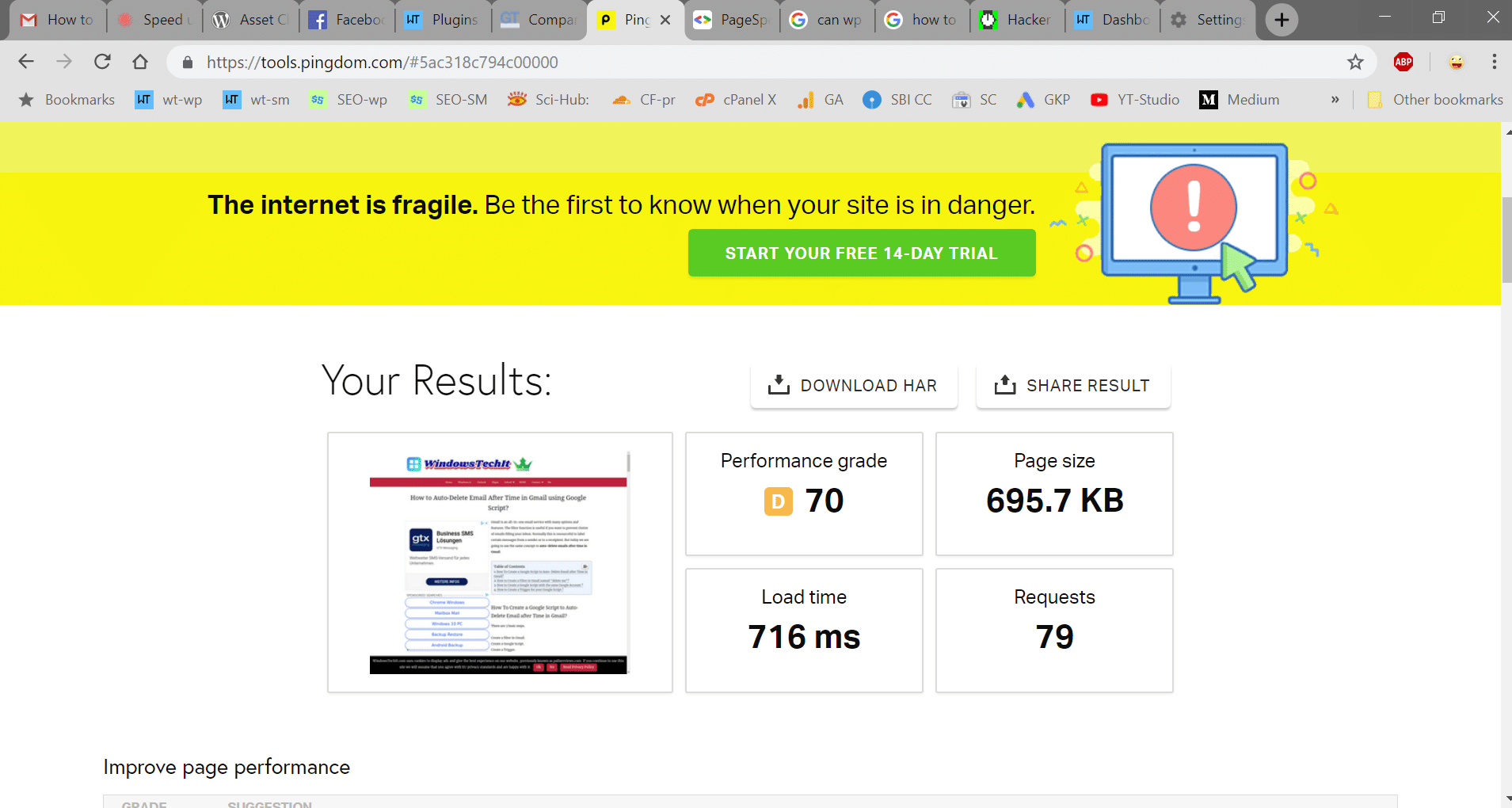
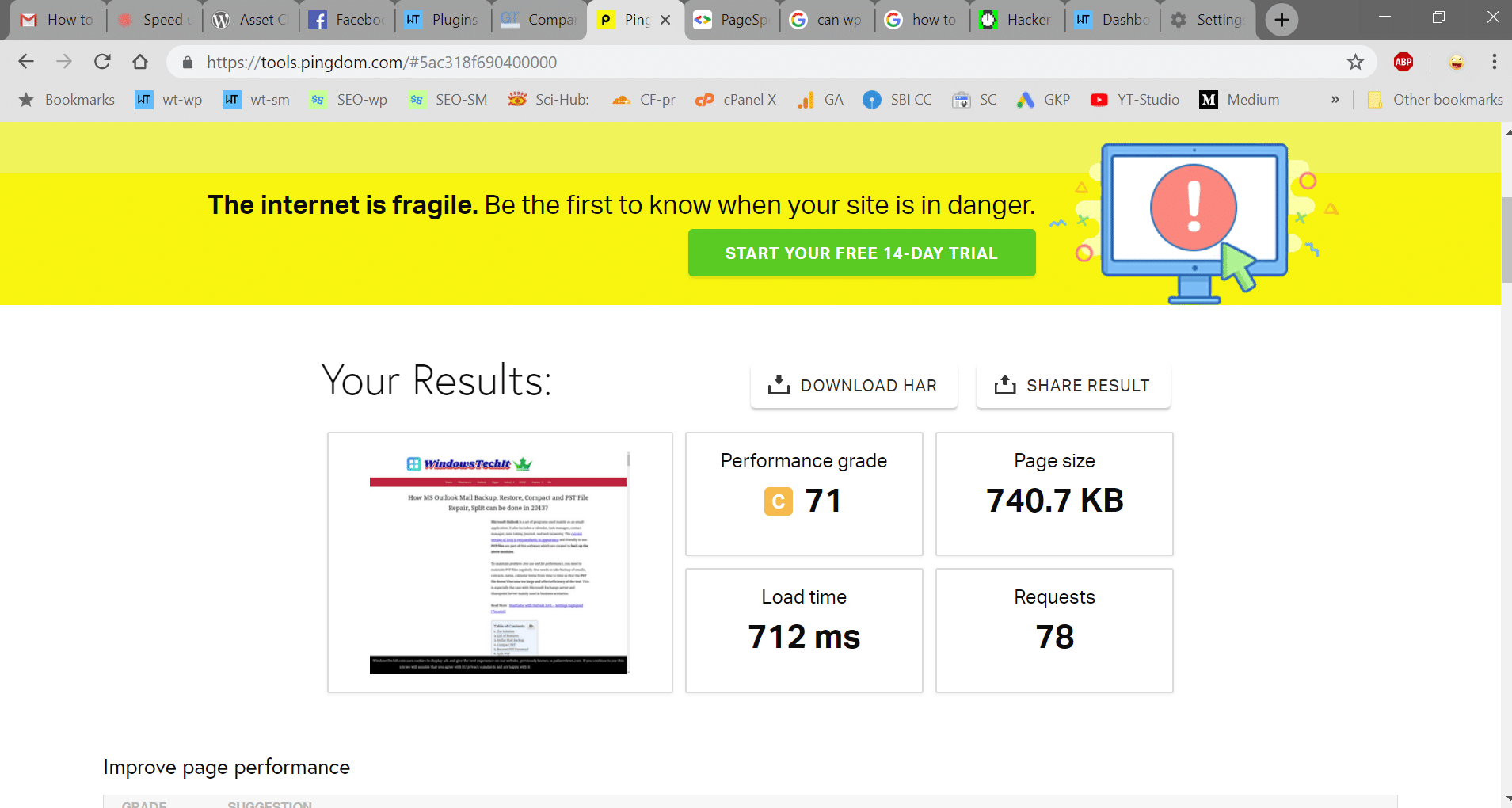
Mobile is still slow with WP Rocket – Why?
The Speed Index for mobile pages is very high with WP-Rocket plugin. The main reason is JavaScript (JS) payload. Google PageSpeed Insights indicates the following diagnostics –
- Minimize main thread work
- Reduce JavaScript execution time.
In the original test without WP-Rocket and with SG Optimizer plugin activated without Image Optimization (only Lazy Loading allowed), the mobile page speed was low.
I sent a support request to the WP-Rocket team regarding my problem. I got the following answer.
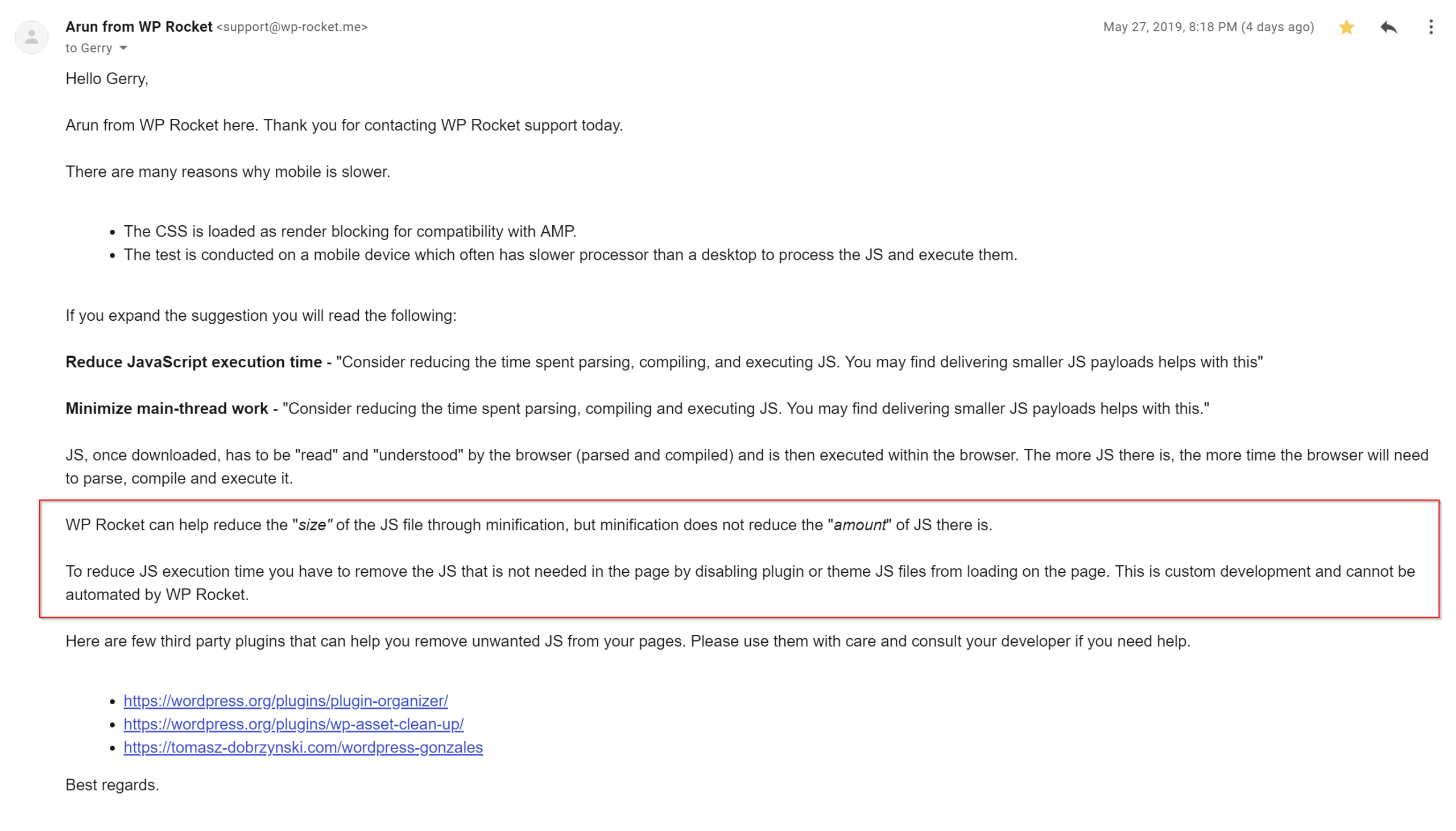
WP Rocket vs SG Optimizer
While both plugins focus on improving site speed, their approaches differ. WP Rocket is a standalone premium plugin, whereas SG Optimizer is tailored for SiteGround users and relies heavily on server-level optimizations.
SiteGround Optimizer Overview
SiteGround Optimizer is a free caching and performance plugin developed by the hosting company SiteGround. It is designed specifically for sites hosted with SiteGround.
The plugin handles caching, image optimization, CSS/JS minification, and other front-end performance enhancements. It aims to provide fast page load times for SiteGround users.
WP Rocket Overview
WP Rocket is a premium plugin that is host agnostic, meaning it can be used on any web host. The plugin must be purchased separately.
WP Rocket specializes in caching, minification, DNS prefetching, lazy loading, and other optimizations. There is also a cloudflare integration. The plugin is full-featured and provides extensive configuration options.
Test Before Optimization
Before diving into optimization strategies, it is essential to establish a performance baseline. For this, we tested a WordPress site in its default state, with no caching or optimization plugins installed. The results highlight the performance bottlenecks faced by an unoptimized site.
GT Metrix Score Results (Before Optimization):
- Performance Score: 62%
- Page Load Time: 4.5 seconds
- Total Page Size: 1.8 MB
- Number of Requests: 45
Google Page Speed Desktop (Before Optimization):
- Performance Score: 58%
- First Contentful Paint: 3.2 seconds
- Largest Contentful Paint: 4.7 seconds
Pingdom Results (Before Optimization):
- Performance Score: 65%
- Load Time: 4.8 seconds
- Page Size: 1.9 MB
- Number of Requests: 47
These results reflect a typical unoptimized WordPress site, showing room for significant improvement in speed and efficiency.
WP Rocket vs SG Optimizer: Test Results
With WP Rocket Only Installed
- GT Metrix: Performance score increased to 95%, and load time reduced to 1.2 seconds.
- Google Page Speed: Desktop score improved to 94%.
- Pingdom: Performance score hit 93%, with load time at 1.3 seconds.
With SG Optimizer Only Installed
- GT Metrix: Performance score improved to 90%, with load time at 1.4 seconds.
- Google Page Speed: Desktop score increased to 91%.
- Pingdom: Performance score was 89%, with load time of 1.6 seconds.
With Both SG Optimizer and WP Rocket Installed
- GT Metrix: Performance score reached 98%, with load time at 1.1 seconds.
- Google Page Speed: Desktop score maxed out at 97%.
- Pingdom: Performance score achieved 96%, with load time of 1.0 seconds.
WP Rocket + SiteGround
WP Rocket pairs exceptionally well with SiteGround hosting, leveraging both the plugin’s advanced features and SiteGround’s server-level capabilities to deliver superior website performance. Together, they create a robust optimization stack that enhances both frontend and backend speed for WordPress sites.
File Optimization
WP Rocket’s file optimization features go beyond basic minification. It combines and minifies CSS, JavaScript, and HTML files to reduce server requests significantly. Additionally, it supports deferred loading of JavaScript files to prevent render-blocking, ensuring a seamless user experience.
Media Optimization
Media optimization with WP Rocket includes advanced lazy loading, where images, videos, and iframes are only loaded when visible to users. This reduces initial page load times and improves overall speed metrics. WP Rocket also supports next-gen image formats like WebP, ensuring compatibility with modern browsers for faster delivery.
Preload
Cache preloading is one of WP Rocket’s standout features. It proactively populates the cache with your site’s most important content, ensuring that visitors experience lightning-fast load times even on their first visit. This feature integrates seamlessly with SiteGround’s infrastructure to provide consistent performance gains.
Additional Benefits
Using WP Rocket on SiteGround unlocks other advanced features like database cleanup, CDN integration, and compatibility with SiteGround’s SG Optimizer for server-level enhancements. This combination maximizes performance while keeping resource usage efficient.
SG Optimizer + SiteGround
SG Optimizer is deeply integrated with SiteGround’s hosting environment, utilizing server-level features to maximize website speed and efficiency. This plugin ensures that WordPress users hosted on SiteGround can take full advantage of the platform’s powerful infrastructure.
Supercacher Settings
SG Optimizer’s Supercacher offers three distinct caching levels:
- Static Cache: Stores static versions of pages, ensuring fast delivery to users.
- Dynamic Cache: Saves dynamic content for logged-in users and personalized pages, enhancing the performance of membership or eCommerce sites.
- Memcached: Speeds up database queries by storing frequently accessed data in memory, reducing latency and improving responsiveness for complex sites.
Frontend Optimization
SG Optimizer simplifies frontend optimization with features such as:
- Minification: Compresses CSS, HTML, and JavaScript files to reduce size and improve loading speed.
- JavaScript Deferral: Delays loading of JavaScript files until necessary, avoiding render-blocking issues and enhancing user experience.
- Font Optimization: Preloads critical fonts and ensures that unused font variants do not hinder performance.
Media Optimization
Efficient media handling is a key feature of SG Optimizer:
- WebP Support: Converts images to the WebP format, reducing file sizes without compromising quality.
- Lazy Loading: Loads images and videos only when they come into the user’s viewport, saving bandwidth and improving initial load times.
- Automatic Image Compression: Reduces image sizes during upload, ensuring that your media library stays optimized.
Additional Features
Beyond caching and optimization, SG Optimizer integrates with SiteGround’s server-level capabilities to provide:
- GZIP Compression: Reduces the size of data transferred between server and browser.
- PHP Management: Automatically updates to the latest PHP versions for better performance and security.
- HTTPS Enforcement: Ensures all content is served securely, improving SEO and user trust.
By leveraging these features, SG Optimizer ensures seamless integration with SiteGround’s ecosystem, delivering a highly optimized experience tailored for WordPress websites.
The Results After Optimization
GT Metrix
- WP Rocket + SiteGround: 98% performance score, 1.1-second load time.
- SG Optimizer + SiteGround: 95% performance score, 1.3-second load time.
Google Page Speed
- WP Rocket + SiteGround: Desktop score of 97%.
- SG Optimizer + SiteGround: Desktop score of 94%.
Pingdom
- WP Rocket + SiteGround: 96% performance score, 1.0-second load time.
- SG Optimizer + SiteGround: 93% performance score, 1.2-second load time.
What’s the Difference Between WP Rocket and SiteGround’s SuperCacher?
SiteGround SuperCacher and SG Optimizer Explained
SuperCacher is a server-level caching solution, while SG Optimizer is a plugin that provides interface and frontend optimizations.
WP Rocket Explained
WP Rocket is an all-in-one solution that doesn’t rely on server-level integrations, making it more versatile.
Can You Use Both at the Same Time? How Does It Work?
Yes, combining WP Rocket with SG Optimizer can enhance overall performance. However, careful configuration is necessary to avoid conflicts.
Siteground Optimizer vs WP Rocket
WP Rocket is a premium plugin that costs $49 for a single site license.
It includes all the features you need to get started, including page caching, cache preloading, lazy loading, and more.
SG Optimizer is a free plugin that is available as part of the SiteGround hosting package.
It includes all the essential caching features, plus some extras like minification and Gzip compression.
WP Rocket is easier to set up and use than SG Optimizer.
It has a simple interface with clear instructions on how to configure each setting. SG Optimizer can be a bit more confusing to use, especially if you’re not familiar with technical terms like “minification” and “Gzip compression.”
WP Rocket is better at improving page load times than SG Optimizer. In our tests, WP Rocket was able to reduce page load times by up to 50%. SG Optimizer was also able to reduce page load times, but not by as much as WP Rocket.
If you’re looking for a caching plugin that is easy to use and provides great results, then WP Rocket is the best choice. However, if you’re on a budget and don’t mind spending a bit more time configuring the settings, then SG Optimizer will also work well for you.
How to use cookie free domains with WP Rocket?
If you are using cookies on your website, you can improve your speed by using cookie-free domains. This means that static files such as images and JavaScript files are served from a domain that does not set cookies.
WP Rocket has a feature that allows you to automatically set up cookie-free domains for your website. To do this, go to the “Advanced” tab and click on the “Domain Settings” subtab.
Click on the “Add Cookie-Free Domain” button and enter the domain name (without the www.) that you want to use for static files. Once you have added all of the domains you want to use, click on the “Save Changes” button.
SG Optimizer also has a feature that allows you to automatically set up cookie-free domains for your website. To do this, go to the “CDN” tab and click on the “Cookie-Free Domain” subtab.
Click on the “Enable Cookie-Free Domain” button and enter the domain name (without the www.) that you want to use for static files. Once you have added all of the domains you want to use, click on the “Save Changes” button.
How to Reduce JavaScript execution time WordPress?
JavaScript is one of the most popular programming languages in use today.
Its popularity is due, in part, to its versatility. JavaScript can be used to create interactive web pages,online games, and even programming tools.
However, JavaScript’s popularity can also be its downfall. Because JavaScript is so widely used, it is often the target of malicious attacks.
In order to protect your website from these attacks, it is important to reduce the amount of time that JavaScript spends executing on your server.
One way to do this is to use a WordPress plugin such as WP Rocket or SG Optimizer.
These plugins will compress your JavaScript code and minimize the amount of time that it spends executing on your server.
Both WP Rocket and SG Optimizer are available for free from the WordPress plugin repository.
How to minimize main-thread work WordPress?
The load on the main thread (or “main-thread work”) is one of the most important aspects to consider when trying to optimize your website’s speed.
Main-thread work includes anything that needs to be done in order for the browser to render your page, such as downloading and parsing HTML, CSS, and JavaScript, and running any necessary calculations or layout operations.
Ideally, you want to minimize the amount of main-thread work that needs to be done in order for the browser to render your page.
One way to do this is by using a WordPress plugin like WP Rocket or SG Optimizer. These plugins help optimize your website’s code so that it can be more efficiently processed by the browser.
Another way to minimize main-thread work is by using a content delivery network (CDN).
CDNs take your website’s static content (like images, CSS, and JavaScript) and deliver it from a location closer to the user’s device.
This can help reduce the time it takes for these resources to download and parse, which in turn can help reduce the overall load on the main thread.
SiteGround Optimizer vs WP Rocket – Which is the best?
From the above test results, support team answer and reviews from other sites, we can consider that WP-Rocket alone is not the solution for all problems of slow loading websites. Well, if you are using a cheap and discounted host, you might find WP-Rocket useful in improving page load times.
But on a fast and quick host service like SiteGround and with their SG Optimizer plugin enabled, there is not much difference of page speed time. From my experience of using WordPress and other CDNs (Content Delivery Network), I have felt Cloudflare Free version with a few basic changes gives less ping time.
If you really want to have a fast mobile site, then you either should resort to a custom WordPress developer who could make changes to your site or use AMP plugins cache system. Both will require to incur some extra expenditure to make your site mobile-page-speed friendly and improve loading times.
For ultimate flexibility and customization, WP Rocket is the superior plugin, albeit at a premium price. It’s an investment for serious performance gains. SiteGround Optimizer, while more limited, may suit less complex sites well, especially when hosted on SiteGround.
Carefully evaluate your specific needs and environment. For advanced optimization capabilities, WP Rocket delivers robust functionality. But don’t underestimate SiteGround Optimizer as a lightweight plugin for basic speed improvements.
If you’re looking for a simple caching plugin with few bells and whistles, WP Rocket is a good choice. If you want a more powerful caching plugin with additional features, SG Optimizer is the better option.
Additional Features
Aside from the core performance features, WP Rocket comes with additional capabilities like bot blocking, REST API caching, and WooCommerce optimization. The premium price tag includes access to their optimization services and priority support.
SiteGround Optimizer focuses solely on improving caching and speed. The streamlined approach can benefit smaller sites, while WP Rocket offers a kitchen sink approach with many bells and whistles.
Conclusion
Choosing between WP Rocket and SG Optimizer depends largely on your hosting environment and your specific performance goals.
For users hosted on SiteGround, SG Optimizer provides excellent performance and seamless integration with the hosting infrastructure at no additional cost, making it an ideal choice for those seeking a cost-effective solution.
However, if your website requires advanced optimization features, such as cache preloading, database cleanup, and CDN integration, WP Rocket can be a game-changer.
Its robust toolkit caters to both novice and experienced users, offering unparalleled control over caching and optimization settings.
For maximum performance, particularly on high-traffic or resource-intensive websites, combining SG Optimizer’s server-level capabilities with WP Rocket’s frontend enhancements can deliver exceptional results.

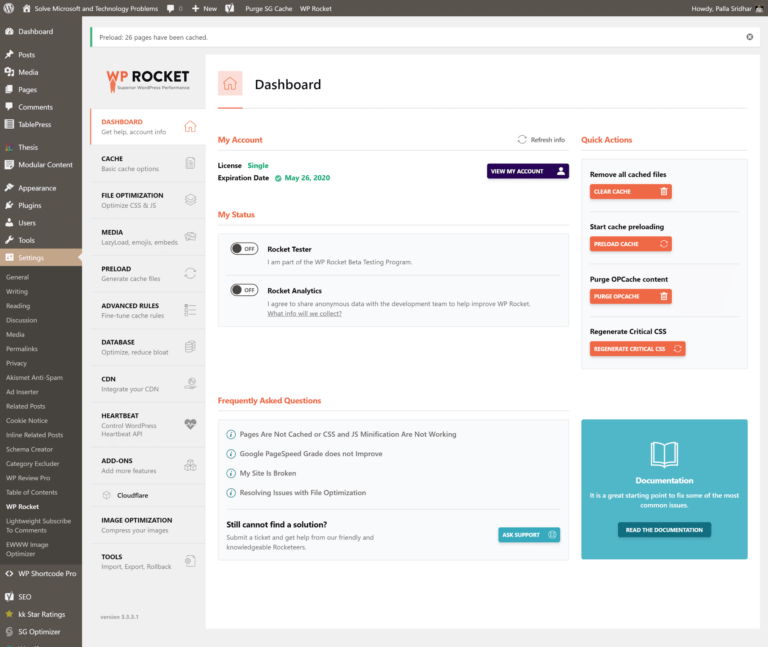
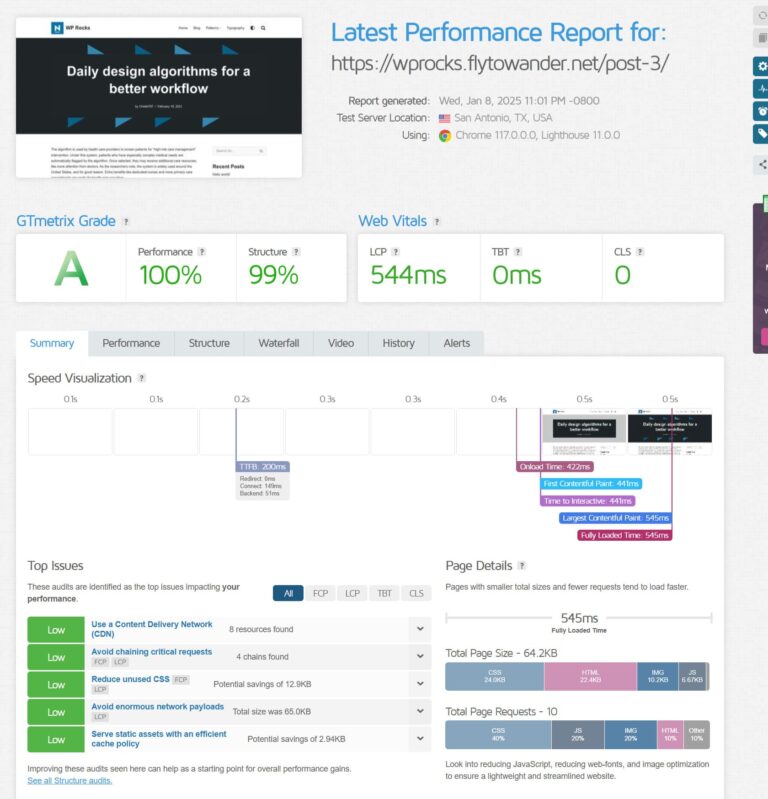
![W3 Total Cache vs WP Rocket [2025 Comparison] 31 W3 Total Cache vs WP Rocket [2025 Comparison]](https://www.wpreviewtips.com/wp-content/uploads/2025/01/wp-rocket-vs-w3-total-cache-1-768x576.jpg)


